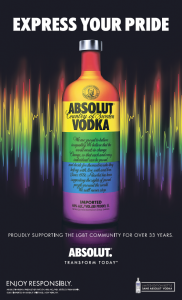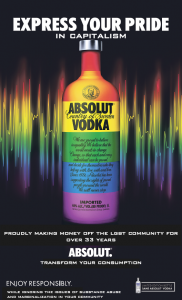
Original Absolut ad – “Express Your Pride”
Corporate sponsorship in pride events, sometimes known as rainbow capitalism, is an increasing issue. It’s hard to attend a pride event without seeing an ad for Absolut, or rainbow flags with a Scotiabank or TD logo on them. Although some may argue that corporations including rainbows or symbols of pride in their advertisements is a symbol of increasing acceptance, or that the increased visibility of queer people due to corporate sponsorship is a positive thing, there are definite critiques to the involvement of corporations in pride events. First of all, we must question which types of queer people are most likely to be included in corporate pride. Are all queer people represented equally, and do we all benefit equally? Probably not – I would argue that corporate pride is much more likely to cater to white, cis, able-bodied queers than anyone else. Ads such as this one bring a few questions to mind for me. What are the implications a corporation making money off of a movement that was started by a black trans woman? When Absolut makes a profit off of selling rainbow vodka, what does that money go towards? Queer young adults are more likely than their heterosexual peers to engage in alcohol misuse, likely due to the stress of marginalization (Livingston et al., p. 125). Additionally, many queer-centric spaces are focused on alcohol consumption, such as bars or clubs. It can be difficult for queer people to find community in spaces that are not centred around alcohol. Given all of these factors, I find Absolut running vodka ads for pride to be problematic. I interpret the meaning of this ad to be that “expressing your pride” involves buying the right brands, consuming the right products, and making alcohol consumption central to pride celebrations. The focus on consumption in ads such as this de-politicizes pride and make its roots in radical resistance invisible. In my culture jam, I intend to critique this co-optation of pride by corporations by subverting some of the messages in the ad.

“Jammed” Absolut ad – “Express Your Pride in Capitalism”
Here you can see my “jammed” version of the Absolut ad. By changing some of the text in the original ad, I first of all hoped to shed light on the co-opting of pride by corporations. The initial ad is attempting to sell you the idea of pride, but the rainbow bottle is only another tool for Absolut to make a profit. It symbolizes a brand making money off of the marginalization of queer people, when queer people are likely not benefitting from this marketing ploy. Although the rainbow may convey some messages of pride and acceptance, queer people are not going to be liberated from oppression by corporations using rainbows in their advertisements. Since we live in a consumerist society, consumption becomes a way of displaying our political views, but using the consumption of rainbow products to show acceptance is a fairly ineffective way of working towards liberation and anti-oppression if you ask me. Someone could easily buy this vodka and still harbour heterosexist and/or cissexist biases. Buying rainbow products could be used as a cop-out to avoid examining one’s internalized prejudices – “See, I bought the limited-edition pride vodka, I support gay people, I can’t be homo/bi/transphobic!”. By recreating this ad, I hope to shed light on the tensions surrounding using a marginalized community as a marketing tool. Another issue that I wanted to shed light on is the disproportionate rates of substance abuse among queer people. Using symbols of pride as a marketing tool to sell alcohol is extra harmful when you consider that LGBT people are unequally affected by issues of substance use. My goal with this assignment is to encourage people to think critically about corporate involvement in pride and the ads we see during pride month, as well as how queer communities may be affected by them.
References
Livingston, N. A., Christianson, N., & Cochran, B. N. (2016). Minority stress, psychological distress, and alcohol misuse among sexual minority young adults: A resiliency-based conditional process analysis. Addictive Behaviours, 63, 125-131.